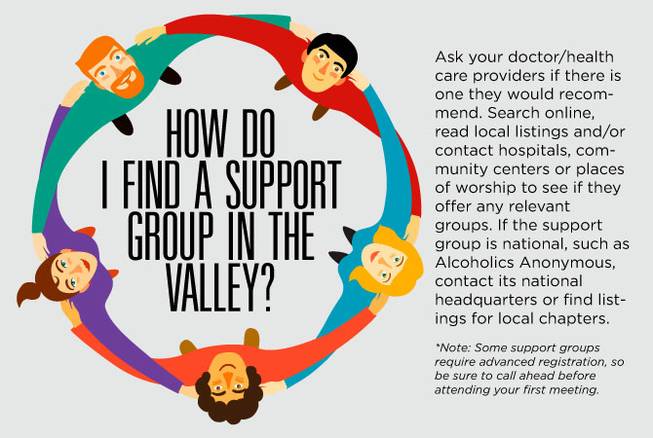
Sunday, May 1, 2016 | 2 a.m.
Knowing where to turn during life’s tough moments can be difficult. From traditional therapy and psychology to holistic healing, self-help methods and beyond, there is no shortage of potentially beneficial options. But finding something that works for you, especially during turmoil or emotional distress, can seem daunting.
Within the sea of resources, support groups often are a powerful source of comfort for their members. “Support groups aren’t a substitute for professional health treatment, but they can be a great complement to it,” said Rita Moore, H2U Program Manager at MountainView Hospital.
While the idea of attending a support group may make some people nervous, it can be deeply beneficial for those in need.
What is a support group? Is it like group therapy?
A support group is a facilitated meeting of peers dealing with a common issue with the goal of providing mutual support for one another. Support groups focus on camaraderie and shared experiences to comfort, encourage and educate members.
While doctors or therapists can coordinate and participate in support groups, these groups don’t need to be managed by healthcare professionals. Often, the person guiding the group is someone with an extended knowledge about the topic (usually from firsthand experience).
This differs from group therapy, which is led by a certified therapist for the purpose of treating the mental health of each member. Though group therapy and support groups are largely different, similar social dynamics can occur between members in both settings.
Benefits of a support group
Emotional support: The emotional support offered by the right support group is a primary reason many people attend groups. It gives members a chance to express themselves in an understanding, nonjudgmental environment and communicate with others who are going through the same issues.
Social outlet: Many people may feel isolated by whatever brought them to the support group to begin with, so being able to find, socialize and even build relationships with similar people is invaluable.
Practical information and education: Beyond the emotional and social benefits, support groups are a great place to learn and gather firsthand advice. Members can discuss coping skills, offer tips for managing symptoms and share other pieces of experiential information.
What kinds of issues do groups address?
• Chronic or serious illness, such as diabetes or cancer
• Depression and anxiety
• Weight loss and exercise
• Addiction and smoking cessation
• Situational crises, such as divorce, unemployment or the loss of a loved one
Support groups aren’t limited to the individual personally struggling with the designated issue. Family, spouses and close friends often attend support groups to get a better understanding of what their loved one is going through and to discuss it with people who have had similar experiences. Some groups are dedicated specifically to the family and friends of people who are chronically ill.
Should I consider a support group?
Support groups can be great for some people and not so ideal for others. Some may struggle with discussing personal topics with strangers or feel uncomfortable addressing certain subjects. Emotional support and guidance come in many different forms, so it’s important to go with what feels best for you.
If you are interested in trying out a support group, do some research. Look for a group that is geared toward your specific concern, has a designated facilitator, is confidential and has established ground rules.
Once you’ve found a group that seems to meet your needs, plan on attending a few meetings to test the waters. If you like it and feel as though regular attendance would be beneficial to you, great. If you don’t like it, look for another group until you find one that clicks for you.
You should feel comfortable, accepted and nurtured by a support group; if there’s ever a time when you don’t feel that way, re-evaluate the situation and make a change if need be.
How do I find one in the Valley?
• Ask your doctor/health care providers if there is one they would recommend.
• Search online, read local listings and/or contact hospitals, community centers or places of worship to see if they offer any relevant groups.
• If the support group is national, such as Alcoholics Anonymous, contact its national headquarters or find listings for local chapters.
Note: Some support groups require advanced registration, so be sure to call ahead before attending your first meeting.

Join the Discussion:
Check this out for a full explanation of our conversion to the LiveFyre commenting system and instructions on how to sign up for an account.
Full comments policy